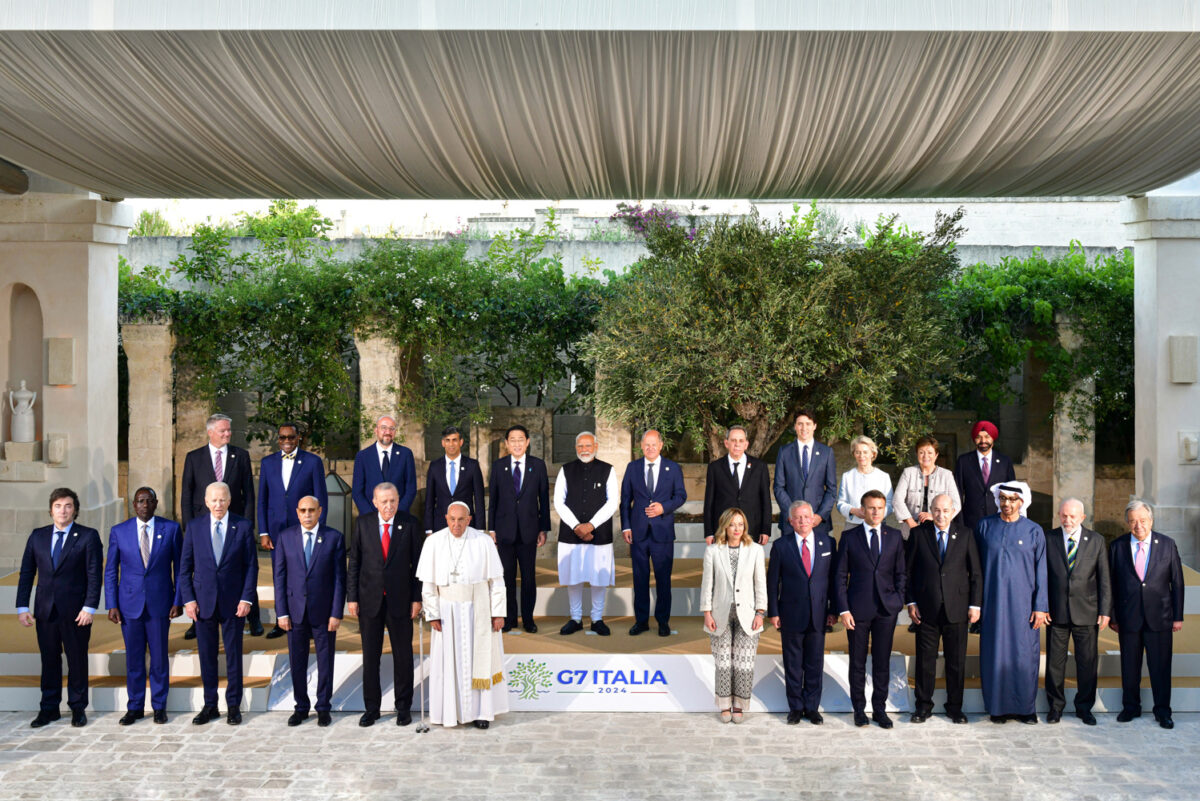The recent G-7 summit 2024, held from June 13-15 in Italy’s scenic Apulia region, brought together leaders from the U.S., Canada, Germany, France, Japan, the U.K., and Italy, along with the European Union leadership. This critical meeting aimed to address various global challenges, including the Ukraine conflict, investment in Africa, migration, climate change, and artificial intelligence. Here’s a comprehensive look at the summit’s agenda, India’s involvement, and its broader implications.
Summit Agenda: Key Issues Addressed
Reducing Global Disparities
The G-7 summit focused on fostering inclusivity and bridging the gap between Western nations and the rest of the world. This theme permeated many discussions, highlighting the need for a more balanced global order.
Supporting Ukraine
A significant part of the summit was dedicated to the Ukraine conflict. The G-7 leaders agreed to provide $50 billion for Ukraine, utilizing frozen Russian sovereign wealth funds. Ukrainian President Volodymyr Zelenskyy attended, advocating for increased support from Western allies.
Investing in Africa
The “Energy for Growth in Africa” initiative aimed to boost clean energy investments across the continent. This aligns with Italian Prime Minister Giorgia Meloni’s Mattei plan, which seeks to position Italy as a crucial energy link between the EU and Africa, reducing dependency on Russian gas.
Managing Migration
Migration was a key issue, especially for Italy. The summit discussed strategies to manage migration effectively, including agreements with African nations to limit migrant flows and facilitate the return of unsuccessful asylum seekers.
Addressing Climate Change and AI
Climate change and artificial intelligence were prominent topics. The G-7 aims to strengthen commitments to reducing emissions and explore new strategies to meet climate goals, particularly focusing on phasing out coal-fired power plants by the mid-2030s. The summit also emphasized the importance of using AI to bridge global inequalities.
Economic Security in the Indo-Pacific
The Indo-Pacific region’s strategic importance was highlighted, particularly for Japan. The G-7 countries are developing policies to engage more deeply with this region, recognizing its economic potential and the strategic challenge posed by China’s growing influence.
India’s Involvement: A Critical Role
Importance of India’s Participation
India has been an essential part of the G-7 outreach process for several years, reflecting its increasing global significance. Prime Minister Narendra Modi attended the summit for the fifth time, underscoring India’s strategic partnerships with multiple G-7 countries and its role in the Indo-Pacific region as a counterbalance to China.
Prime Minister Modi’s Contributions
During the outreach session, Prime Minister Modi highlighted the significance of Indian elections, describing them as a “victory of the democratic world.” He discussed the need to harness technology and AI to address global inequality and outlined a roadmap to combat climate change. Modi also emphasized the importance of addressing the Global South’s concerns, especially in light of global uncertainties and tensions.
Bilateral Meetings
Prime Minister Modi engaged in numerous bilateral meetings with key global leaders, including U.K. Prime Minister Rishi Sunak, French President Emmanuel Macron, German Chancellor Olaf Scholz, Japan Prime Minister Fumio Kishida, and Italian Prime Minister Giorgia Meloni. He also met with Ukraine President Volodymyr Zelenskyy and U.S. President Joe Biden, strengthening India’s diplomatic ties and setting priorities for his new term in office.
The Future of the G-7: Challenges and Relevance
Criticisms and Challenges
The G-7 faces increasing criticism for being an exclusive group lacking representation from major global economies like China, India, and Brazil. The effectiveness of the G-7 has been questioned, especially regarding its ability to influence significant global events, such as Russia’s invasion of Ukraine and China’s expanding global influence.
Reinventing the G-7
As the G-7 prepares for its next summit in Canada’s Alberta region in 2025, the group faces the challenge of reinventing itself to remain relevant. The potential for a different composition of leaders, given impending elections in the U.K. and the U.S., adds to the uncertainty.
Conclusion
The G-7 summit in Italy addressed critical global issues, emphasizing the need for cooperation and inclusivity. India’s participation highlighted its strategic importance on the global stage, contributing significantly to discussions on democracy, technology, and climate change. As the G-7 looks to the future, it must adapt to maintain its relevance in an evolving global landscape.
